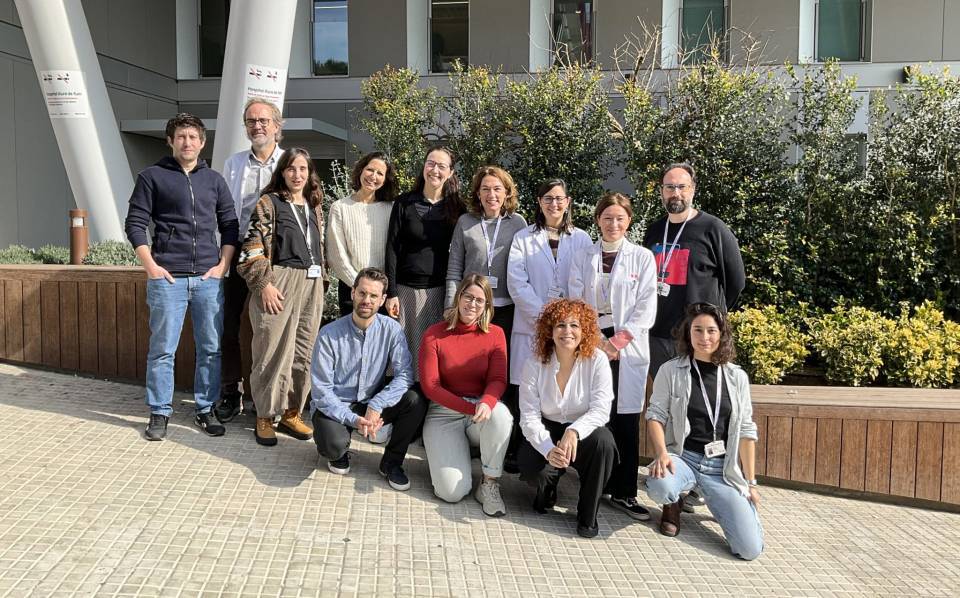The collective research effort of the European Network for Translational Research-Chronic Liver Failure (ENTR-CLIF) with Clínic-IDIBAPS participation, has uncovered a promising new way to strengthen the immune system in patients with acutely decompensated cirrhosis, a severe form of liver disease that leaves patients highly vulnerable to infections. The research, recently published in JHep Reports, demonstrates that albumin, a protein commonly used in clinical settings, can reshape the immune landscape by enhancing both B cell and neutrophil function.
Using advanced techniques like single-cell RNA sequencing (scRNA-seq) and flow cytometry, researchers found that albumin exposure leads to an expansion of B cells—key players in the body's immune response—and improves neutrophils' ability to defend against pathogens. These findings suggest that albumin does more than just stabilize blood volume in patients with acutely decompensated cirrhosis—it also strangthens their compromised immune systems, potentially lowering their risk of life-threatening infections.
Cirrhosis, a chronic liver disease, can progress to a state known as acutely decompensated cirrhosis, where the liver’s inability to function properly causes significant complications, including a weakened immune system. Patients in this stage are particularly prone to infections, which can be life-threatening due to their diminished immune defenses.

This research aimed to uncover how albumin, a protein already used to treat hospitalized patients with acutely decompensated cirrhosis, influences the immune system. The study analyzed blood samples from both patients with acutely decompensated cirrhosis and healthy volunteers, looking at how albumin affects immune cells. Researchers focused on two key components of the immune system: B cells, which are responsible for producing antibodies, and neutrophils, a type of white blood cell that kill bacteria and other pathogens.
“Patients with acutely decompensated cirrhosis are immunocompromised and particularly susceptible to infections. A recent study has demonstrated that patients with acutely decompensated cirrhosis receiving albumin as treatment had lower incidence of infections. Our study investigated the reason by which the albumin molecule may lower the incidence of infections”, said Joan Clària, co-first author in the paper, head of the Inflammation and liver disease research group from IDIBAPS, Principal Investigator at EF CLIF and member of CIBERhed, , who serves as Director of the Grifols Chair since 2021.
The research team employed scRNA-seq—a technology that allows scientists to look at the gene expression profiles of individual cells—to investigate the impact of albumin on these immune cells. In patients exposed to albumin, B cells showed significant changes, including increased activity and expansion. Neutrophils, on the other hand, exhibited enhanced antimicrobial functions such as phagocytosis (the process of engulfing pathogens), chemotaxis (the movement of cells toward infection sites), and swarming (a collective response to invading microorganisms).
“Our study provides data supporting the ability of albumin to boost the antimicrobial functions of immune cells in patients with acutely decompensated cirrhosis, specifically by promoting the expansion of the B cell compartment and by rescuing the neutrophil defensive functions”, explained Clària. “Our study has a strong mechanistic component thanks to the collaboration with expert laboratories in B cells and neutrophils and scRNA-seq technologies led by Andrea Cerutti (Hospital del Mar Research Institute, Barcelona), Daniel Irimia (Massachusetts General Hospital, Harvard Medical School, Boston), and Holger Heyn (Centro Nacional de Análisis Genómico, Barcelona)”, he added.
The research also sheds light on the broader immunological changes induced by albumin, suggesting a role in reprogramming the transcriptional landscape of immune cells. This discovery may pave the way for further innovations in how we treat infections in immunocompromised patients.
“To assess the potential impact of albumin on patient samples, we compared the transcriptomic profiles of individuals before and after the development of ACLF, stratifying them based on whether they received albumin treatment during follow-up. Functional changes and differentially expressed cell types were identified using gene set enrichment analysis (GSEA), a computational method that groups genes with similar functions into gene sets, generating statistics that rank and quantify changes in each set”, said Ferran Aguilar, co-first author in the paper and Bioinformatician at EF CLIF. “This approach reduces the dimensionality of the analysis, facilitating the interpretation of results and the generation of new hypotheses”, he explained.
Researchers hope that these findings will encourage the use of albumin not only for its traditional role in managing low serum albumin or intravascular fluid levels, but also as a strategy to support the immune system in patients with acutely decompensated cirrhosis. Reducing infection rates in this vulnerable population could lead to fewer hospitalizations and better long-term survival outcomes.
"Our findings provide new insights into how albumin helps protect patients with decompensated cirrhosis from infections as shown in the ANSWER study," said Richard Moreau, senior author in the paper and Director of EF CLIF. "By reprogramming B cells and boosting neutrophil functions, albumin therapy could play a crucial role in improving patient outcomes", he added.
The study opens up exciting possibilities for improving care in patients with decompensated cirrhosis. Future research will focus on refining albumin-based therapies and exploring how they could be integrated into standard treatment protocols to reduce infection risks further and improve outcome.
Publication information
Clària J et al. Albumin reprograms the B cell transcriptional landscape and improves neutrophil antimicrobial function in patients with decompensated cirrhosis. JHep Reports 2024. DOI: 10.1016/j.jhepr.2024.101184




